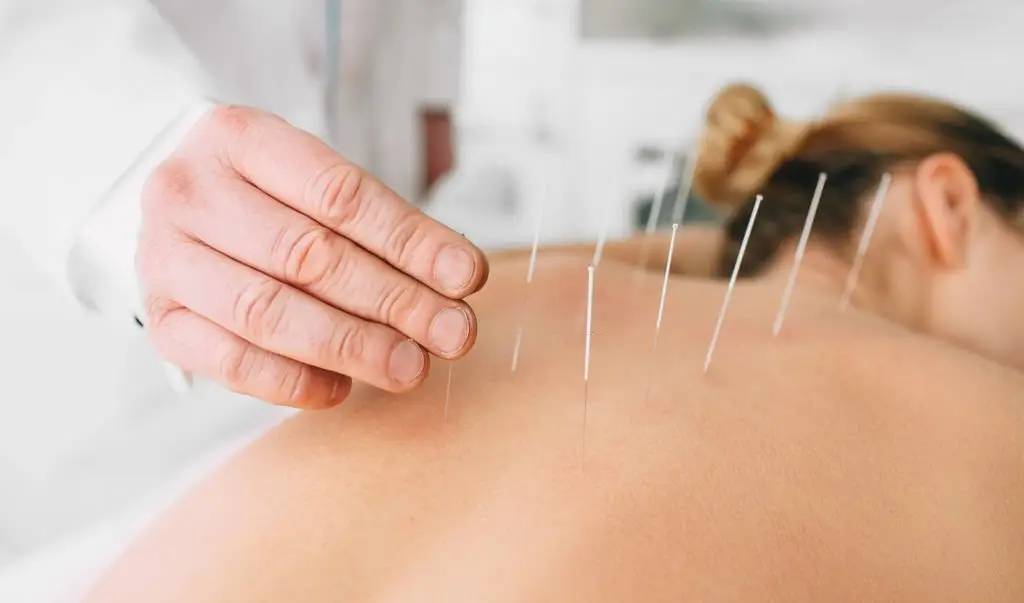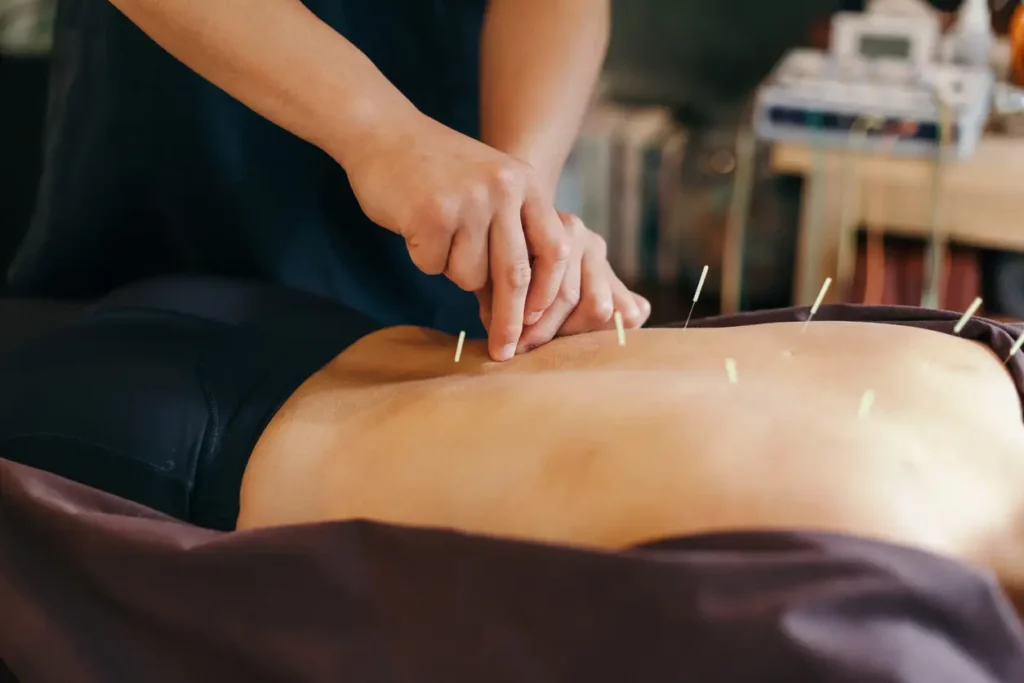Perimenopause: a phase that often brings its share of challenges. The hot flashes, mood swings, and sleep disturbances can be, well, a bit much. But what if there’s a way to ease the discomfort naturally? Enter acupuncture – those tiny needles might just hold the key to making perimenopause a bit more manageable. In this blog, we’ll explore how acupuncture could be the relief you’ve been searching for, in finding comfort during perimenopausal changes.
Contents
Understanding Perimenopause
 Perimenopause is the precursor to menopause, a natural phase typically beginning in the late 30s or early 40s. It signifies a transition marked by hormonal fluctuations, particularly in estrogen and progesterone levels.
Perimenopause is the precursor to menopause, a natural phase typically beginning in the late 30s or early 40s. It signifies a transition marked by hormonal fluctuations, particularly in estrogen and progesterone levels.
Hormonal Changes
During perimenopause, hormonal levels undergo a dynamic shift. Estrogen, a key player, gradually declines, paving the way for the conclusion of the reproductive years.
Signs and Challenges
Perimenopause introduces distinct signals and challenges. Menstrual cycles become irregular, varying from shorter to longer durations. Hot flashes, sudden bursts of heat, may make unexpected appearances. Mood swings and alterations in sleep patterns frequently accompany this transition, presenting a blend of challenges for many women.
Understanding these hormonal shifts and their manifestations equips women to better navigate and manage the distinctive aspects of perimenopause.
Traditional Approaches to Perimenopause
 When it comes to perimenopause, some traditional ways can help make things more manageable. Let’s break it down:
When it comes to perimenopause, some traditional ways can help make things more manageable. Let’s break it down:
- Hormone Replacement Therapy (HRT)
One way people handle perimenopause is through Hormone Replacement Therapy (HRT). This means adding hormones, like estrogen and progesterone, to tackle things like hot flashes and mood swings. But, it’s important to chat with your doc about the pros and cons.
- Lifestyle Tweaks and Food Tips
Simple changes in your daily life and eating habits can make a big difference. Regular exercise, eating a healthy mix of foods, and getting good sleep can help your body deal with the ups and downs of hormones.
- Exercise and Feeling Good
Moving your body regularly is a strong player in dealing with perimenopause. It’s not just about staying fit – exercise helps with mood swings and keeps your weight in check, making the perimenopausal journey a bit smoother.
In a nutshell, traditional ways give you options. You can pick what suits you best, find that sweet spot to tackle perimenopause, and keep feeling your best.
The Role of Acupuncture in Perimenopause: Can It Help?

In the realm of perimenopause, acupuncture emerges as an ancient practice with the potential to offer relief. But first, let’s clarify what acupuncture is all about.
Acupuncture is an age-old practice that involves gently inserting thin needles into specific points on the body. While it might sound a bit unconventional, this traditional technique has been used for centuries to address various health issues.
Historical Context of Acupuncture in Women’s Health:
When it comes to women’s health, acupuncture has a rich historical background. Throughout the ages, it’s been a go-to for addressing a range of health concerns specific to women, including those associated with perimenopause. The historical use of acupuncture in women’s health sets the stage for exploring its potential benefits in navigating the challenges of perimenopause.
Influence on Hormonal Balance:
One of the interesting aspects of acupuncture is its believed influence on hormonal balance. As women undergo the hormonal rollercoaster of perimenopause, acupuncture is thought to interact with the body’s energy flow, promoting balance and potentially easing symptoms like hot flashes and mood swings. While the exact mechanisms are still being studied, many find relief in the ancient art of acupuncture during this transitional phase.
In the upcoming sections, we’ll delve deeper into the science behind acupuncture and its effectiveness in addressing various perimenopausal symptoms. Let’s uncover whether those tiny needles might hold the key to a smoother perimenopausal journey.
Effectiveness of Acupuncture for Perimenopausal Symptoms
Curious about how those tiny acupuncture needles might tackle perimenopausal symptoms? Let’s break it down:
Hot Flashes and Night Sweats
 How it May Affect: Hot flashes and night sweats can disrupt sleep, cause discomfort, and impact daily activities, leading to increased stress and irritability.
How it May Affect: Hot flashes and night sweats can disrupt sleep, cause discomfort, and impact daily activities, leading to increased stress and irritability.
How Acupuncture Can Help:
- Traditional Chinese Medicine (TCM) Approach:
- TCM is rooted in yin and yang theory. Assessing the relationship of yin and yang in the kidneys helps guide acupuncture treatment.
- Balancing Energy Flow:
- Acupuncture aims to balance the body’s energy flow, potentially reducing the frequency and intensity of hot flashes and night sweats.
Mood Swings and Anxiety
 How it May Affect: Mood swings and anxiety can affect emotional well-being, relationships, and overall quality of life, creating a sense of unpredictability.
How it May Affect: Mood swings and anxiety can affect emotional well-being, relationships, and overall quality of life, creating a sense of unpredictability.
How Acupuncture Can Help:
- Neurotransmitter Regulation:
- Acupuncture is believed to influence neurotransmitters, such as serotonin and endorphins, contributing to mood regulation.
- Stress Reduction:
- By promoting relaxation, acupuncture may help alleviate stress, providing a natural way to manage mood-related symptoms.
Insomnia
 How it May Affect: Insomnia can lead to fatigue, irritability, and difficulty concentrating, impacting both physical and mental well-being.
How it May Affect: Insomnia can lead to fatigue, irritability, and difficulty concentrating, impacting both physical and mental well-being.
How Acupuncture Can Help:
- Stress Reduction and Relaxation:
- Acupuncture’s ability to address stress may contribute to improved sleep quality and relaxation.
- Balancing Energy:
- By balancing the body’s energy, acupuncture may create a conducive environment for restful sleep.
Fatigue
 How it May Affect: Fatigue can lead to reduced productivity, low energy levels, and impact overall daily functioning.
How it May Affect: Fatigue can lead to reduced productivity, low energy levels, and impact overall daily functioning.
How Acupuncture Can Help:
- Increased Blood Flow:
- Acupuncture may enhance blood flow and lower blood pressure, reducing stress on muscles and potentially alleviating fatigue.
- Boosting Energy Levels:
- By addressing underlying factors contributing to fatigue, acupuncture may help increase overall energy levels.
Vaginal Dryness
 How it May Affect: Vaginal dryness can lead to discomfort, pain during intercourse, and impact sexual well-being.
How it May Affect: Vaginal dryness can lead to discomfort, pain during intercourse, and impact sexual well-being.
How Acupuncture Can Help:
- Hormone Regulation:
- Acupuncture’s influence on hormone regulation, particularly estrogen, may contribute to improved vaginal health.
- Enhancing Blood Circulation:
- Improved blood circulation through acupuncture may support the natural lubrication of the vaginal tissues.
In exploring the potential benefits of acupuncture for perimenopausal symptoms, these insights provide a glimpse into how this ancient practice addresses various aspects of women’s health during this transitional phase.
Finding a Qualified Acupuncturist
 Selecting the right acupuncturist is crucial for a positive and effective experience. Here are some tips to guide your search:
Selecting the right acupuncturist is crucial for a positive and effective experience. Here are some tips to guide your search:
- Check Credentials: Ensure the acupuncturist is licensed and board-certified by the National Certification Commission for Acupuncture and Oriental Medicine. This guarantees a certain level of training and adherence to professional standards.
- Ask about Specialization: Inquire about the acupuncturist’s experience in treating menopause-related concerns. An experienced practitioner with a focus on women’s health is likely to provide more targeted and effective treatment.
- Seek Personalized Insights: Ask about the results the acupuncturist has observed in their practice, especially concerning symptoms similar to yours. This gives you a sense of their track record and the potential effectiveness of their approach.
- Communication Matters: Choose an acupuncturist with whom you feel comfortable communicating. The ability to openly discuss your symptoms and concerns is a key component of a positive acupuncture experience.
- Build a Rapport: Establishing a rapport with your acupuncturist is crucial. Feeling at ease and understood contributes significantly to the overall success of the treatment. Make sure you’re comfortable working with them and that they take the time to understand your unique needs.
Remember, your relationship with your acupuncturist is a partnership in your health journey. By asking relevant questions and ensuring a good fit, you enhance the likelihood of a positive and effective acupuncture experience.
Conclusion
As we wrap up our exploration of acupuncture in the realm of perimenopause, it becomes clear that this ancient practice holds promise for women seeking natural relief during this transitional phase. From the gentle insertion of needles to the intricate balance of yin and yang, acupuncture offers a unique approach to addressing perimenopausal symptoms.
As you consider your options, remember that every woman’s experience is unique. Whether you choose acupuncture, traditional methods, or a combination, the key is finding what resonates with you and empowers you to navigate perimenopause with grace and well-being.
If you are facing menopause related issues, menopause treatment at HerMantra can help. Book your free trial online menopause treatment session now.


